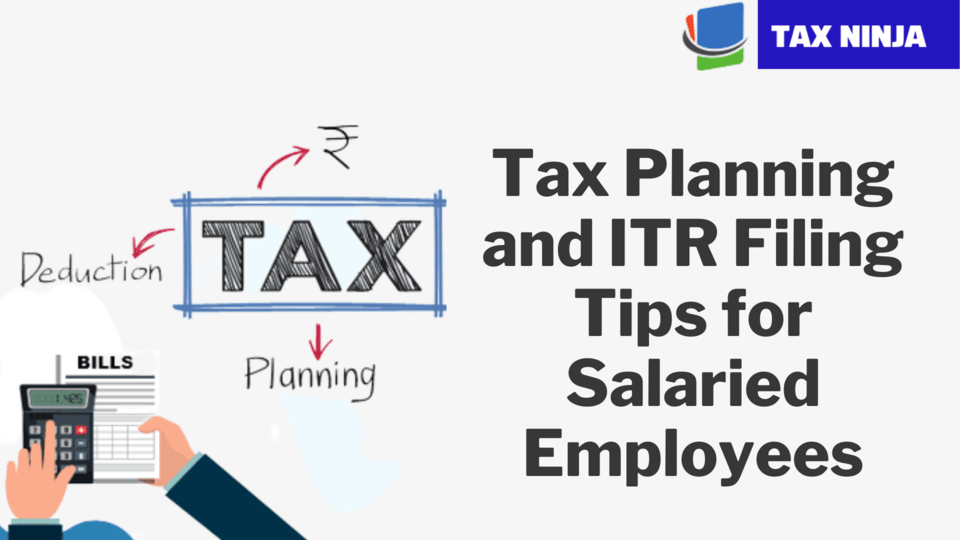

Tax planning and income tax return (ITR) filing are crucial for salaried employees in India. By adopting effective tax planning strategies, individuals can minimize their tax liabilities and make the most of the available deductions and exemptions. Additionally, understanding the process of filing ITR accurately and promptly is essential to avoid penalties and ensure compliance with tax regulations.
Here are some valuable tips and guidance for salaried employees in India to optimize their tax planning and streamline their ITR filing process.
Know the Income Tax Slabs and Rates
Familiarize yourself with the income tax slabs and rates applicable for the relevant financial year. Understand the tax brackets and the corresponding tax rates to calculate your tax liability accurately. This knowledge will help you plan your finances and make informed decisions regarding tax-saving investments.
Utilize Deductions and Exemptions
Take advantage of the various deductions and exemptions available under the Income Tax Act. Some common deductions include Section 80C (for investments in provident funds, life insurance premiums, etc.), Section 80D (for health insurance premiums), and Section 80G (for donations to eligible charities). By availing these deductions, you can reduce your taxable income and lower your overall tax liability.
Optimize Your Salary Structure
Consider restructuring your salary components to maximize tax savings. Explore options such as reimbursing medical expenses, food coupons, and transport allowances, which are tax-exempt up to certain limits. By optimizing your salary structure, you can effectively reduce your taxable income.
Invest in Tax-saving Instruments
Explore tax-saving investment options such as Public Provident Fund (PPF), National Savings Certificates (NSCs), tax-saving fixed deposits, and Equity-linked Savings Schemes (ELSS). These investments not only provide tax benefits but also offer opportunities for wealth creation. Evaluate these instruments' features, risks, and returns to choose the ones that align with your financial goals and risk appetite.
Maintain Proper Documentation
Maintain accurate records and documentation of all financial transactions, including salary slips, Form-16, investment proofs, rent receipts (if applicable), and bank statements. Proper documentation will help you substantiate your claims, ensure compliance with tax regulations, and facilitate a smooth ITR filing process.
File Your ITR on Time
Adhere to the prescribed deadlines for filing your income tax returns. Filing your ITR within the due dates avoids penalties and allows you to claim any tax refunds promptly. Use online platforms or consult a tax professional to file your ITR accurately and efficiently.
As a salaried employee, you are required to file your ITR annually by July 31st (for most individuals).
Review Your Form-26AS
Regularly review your Form-26AS, a consolidated statement showing all the taxes deducted on your behalf by your employer, banks, or any other deductor. Verify the details against your records to ensure accuracy and avoid any discrepancies in your tax calculations.
Utilizing Employee Benefits and Allowances for Tax Savings
Salaried workers should investigate their companies' tax-saving advantages and allowances. HRA, LTA, and medical reimbursements can grant tax exemptions if requirements are satisfied.
If you are a salaried employee staying in a rented accommodation, you can claim tax benefits on the House Rent Allowance (HRA) received as a part of your salary.
Furthermore, if you have taken a home loan, you can avail tax benefits on the principal repayment and the interest paid on the loan. Under Section 80C and Section 24(b) respectively, you can claim deductions for the principal repayment and the interest paid on the home loan.
Understanding the Impact of Salary Restructuring on Taxes
Salary restructuring involves optimizing the components of salary to minimize the tax burden. By considering elements such as basic salary, allowances, reimbursements, and perquisites, employees can effectively structure their salary to minimize their tax liability. Increases in tax-exempt benefits, such as transportation or medical allowances, or selecting tax-friendly extras like food coupons or phone reimbursements can help achieve this.
In conclusion, optimizing tax planning and ITR filing is crucial for salaried employees in India to minimize their tax liabilities and ensure compliance with tax regulations. The above tips empower individuals to make informed financial decisions, maximize tax savings, and avoid penalties. Employees can optimize their tax planning, ensure accurate ITR filing, and achieve long-term financial goals by implementing these strategies. It is important to stay updated with the latest tax laws. By taking proactive steps toward tax planning and ITR filing, salaried employees can enhance their financial well-being and build a strong foundation for future financial success.